When to replace your car
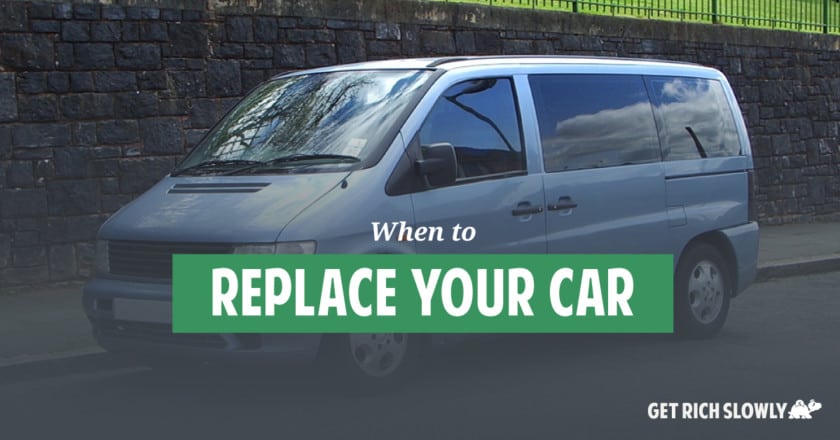
Over the holidays, we said good-bye to an old family member. It was definitely her time to go. She leaked, she conked out at odd times, and she stank. Of course, I'm talking about our old vehicle: a minivan with 182,000 miles on it. I didn't let go of her easily; after all, we didn't get rid of our previous car until it had 264,000 miles on it. I figured we could get the minivan to at least 200,000.
But while visiting relatives in Florida, we had the opportunity to buy a used minivan from my sister's meticulous neighbor for a great price. So we took it. I have to admit, it's been a huge upgrade. It has all kinds of luxury features that our old minivan didn't have, such as:
- When you turn it on, it stays on until you turn it off.
- When it rains, the water stays out of the vehicle.
- There's an electrical device in the cigarette lighter that I can use to charge my cell phone, rather than just an empty hole where an electrical device used to be.
- The speedometer is an accurate reflection of the speed I'm traveling, rather than a number to which I have to add five to 15 mph.
- The brake light comes on only when the emergency brake is actually engaged.
- It has this thing called “air conditioning.”
- It doesn't stink. (The smell in the old car came from water coming in and getting the carpets all moldy.)
- It has a “keyless remote,” which is a device on the key ring with buttons that, when pushed, cause the side doors to slide open.
(Regarding that last feature, here's a trick you can play on the uninitiated: I put the keyless remote in my pocket, and told my mom and my aunt that the doors were voice activated, but you had to use the secret word. In this van's case, I told them, the secret word was “monkey _____.” Since this is a family website, I can't print the actual word, but use your imagination and you'll be close. So I got my 70-something mom and aunt to yell, “Monkey ____!” at the van, pressed the button in my pocket, and — voila! — the doors opened. They just couldn't get over it. “I have to get me one of those!” my aunt exclaimed. I let them yell, “Monkey ___!” at the van for another 15 minutes, closing and opening the doors, until I told them the truth. If I had videotaped it, we'd all be YouTube heroes by now.)
Drive a Lemon, Save
Frugality in practice: Alternate modes of transportation
I've always been a car guy. It's not that I'm mechanically inclined or that I get into the latest makes and models — neither of these is anywhere close to the truth — but that a car has always been my primary mode of transportation.
When I was a boy, my family lived in rural Oregon, six miles from the nearest town. Automobiles were our only real option for getting around. Even when I went away to college, I relied on a car for most of my mobility. And so it's been for forty years. As I say, I've always been a car guy.
This summer, though, I've had a sort of epiphany, one prompted by your comments and suggestions. I've learned that I can save money and improve my fitness by leaving my car at home — by exploring alternate modes of transportation.
<Common car-dealer tricks
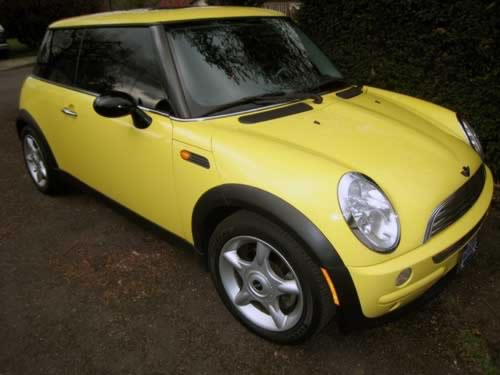 When I bought my used Mini Cooper in April, things didn't go exactly as I'd planned. Part of this was because I hadn't done enough research. But a lot of it was because the dealer had some tricks up its sleeve and I did not.
When I bought my used Mini Cooper in April, things didn't go exactly as I'd planned. Part of this was because I hadn't done enough research. But a lot of it was because the dealer had some tricks up its sleeve and I did not.
At Car and Driver, Jared Gall has compiled a list of car dealer tricks to watch for when buying a vehicle. He says that the following are common practices:
-
- Juggling the foursquare. The "foursquare" is the worksheet on which the salesperson jots down the terms of the deal. It's an easy way for her to manipulate one factor (purchase price, down payment, monthly payments, trade-in value) or another.
-
- Profiting from rebates. Gall warns that salespeople often use the presence of a rebate to manipulate buyer psychology. Don't let that happen to you.
-
- Inflating payments. The more you're willing to pay each month, the more room the salesperson has to work. The article recommends ignoring the question of monthly payments until you've negotiated the price of the vehicle.
-
- Fees and extras. "If it's anything he offers after you've negotiated your sales price, you don't need it and shouldn't pay for it."
-
- Interest-rate bumping. Gall recommends shopping for your own financing before you shop for a vehicle. He also warns that "it is not uncommon for the dealership to secure financing for you at one APR but offer you a rate one percentage point higher — and then pocket the difference." Be careful.
- Altering the bill of sale. Some dealers will leave the contract open-ended. Don't allow this. Don't sign anything with blanks or undefined terms. Be sure the paperwork is complete before you leave the lot.
Gall says there are several other tricks that dealers use, though these are especially underhanded. "If a dealership pulls any of these stunts on you, it doesn't deserve your business," he writes. Continue reading...
Why I drive a 13-year-old car
This article was written by Joel Berry.
I recently had a talk with a friend about why I haven't purchased a new car. He can't understand why I still drive a 1995 Geo Prizm. I can afford to buy a new car, but I choose not to. The fact is, driving an older car saves me money!
To prove my point, I ran some numbers. I was surprised by how much money I've saved by driving this car for so long.
Thoughts on a scooter-based lifestyle
Two years ago when I bought my People 150cc scooter, I was teased ceaselessly by my car-loving friends. It wasn't so long ago that gas was under two dollars a gallon, and the need for more efficient wheeled transportation wasn't as “in your face” as it is now. Today, when my friends talk about my scooter (or my wife's) it's to ask where I got it, for how much, and how much we save by having them.
J.D. recently mentioned he was thinking of forsaking his dream of a Mini Cooper for a scooter instead, but he had some questions. How much money would he save? Could we quantify with some certainty the impact of a scooter on one's budget? Here's my attempt based on my experience.
Safety First
First, I'd like to talk about a few misconceptions. Scooters are not necessarily slow-moving vehicles. Your speed depends on your engine size. I'd think of them more generally as small motorcycles. You're exposed to the elements (more so than a car), and you're giving up the “safety” of a steel box, but you are getting a more maneuverable vehicle.
The inner workings of a car dealership (and how to use them to your advantage)
Yesterday a reader named Dave Black left a long comment on an old article about how to buy a new car without getting screwed. This is his glimpse into the inner workings of a car dealership. I've edited Black's comment to make it a little more readable, but the advice is all his.
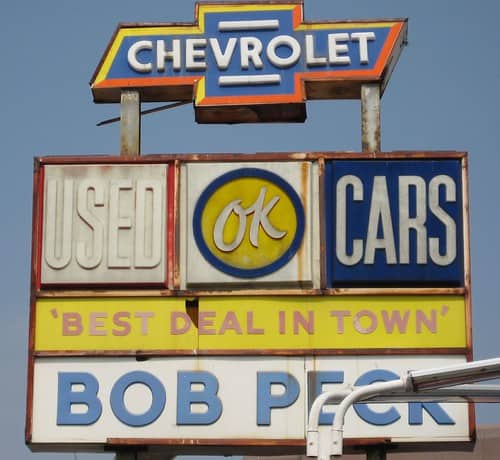
Front of the house profit is derived from the MSRP less the invoice price (the price the dealer actually pays for the car). Each deal has a "pack charge" or "lot fee" of $200-600 or more that goes in as part of the dealer cost, so when a dealer tells you for example, our invoice is $22145, you can subtract $200 to $600 for the lot fee. There are also dealer rebates and consumer rebates to factor in.
Use Fuelly to track your fuel economy
 How fuel efficient is your vehicle? Do you ever get the suspicion, as I do, that your car's gas mileage is getting worse? Have you ever wondered how your mileage compares to other drivers? And what about the estimated mileage touted by the car companies? Does a Mini Cooper really get 37 miles per gallon?
How fuel efficient is your vehicle? Do you ever get the suspicion, as I do, that your car's gas mileage is getting worse? Have you ever wondered how your mileage compares to other drivers? And what about the estimated mileage touted by the car companies? Does a Mini Cooper really get 37 miles per gallon?
Matt Haughey and Paul Bausch have launched a new site called Fuelly, which allows users to track their vehicles' fuel economy and to compare data with other drivers. As you enter data for each fuel up, Fuelly tracks your average number of miles per tank, your average cost per tank, your fuel efficiency, and more.

If you'd like to compare information with other users, you may:
Buy a car or pay off debt?
Earlier this week, April wrote with a personal finance predicament. She and her husband need to buy a car, but it's not something they'd budgeted to do any time soon. Fate intervened:
My husband and I are trying to pay down our debt and to save money. This morning he called to tell me that he had been rear-ended in traffic. He's fine, thankfully, but he thinks they'll total his car, which was paid for. My best guess is that they'll give us $4000. I don't want another car payment, but I'm not sure what to do here.
The payments on my car are $240, and we have two years left. We pay $1013 for the lot we own [on which they plan to build a home --j.d.], and $200 for his motorcycle, which we're trying to sell (keeping the bike isn't an option). The rest goes toward the normal bills and paying off the credit card, which we have about $8000 left on. We don't pay rent right now, don't have cable, and we're cutting back everywhere possible. Our two luxuries are Netflix and high-speed Internet.
Shaking the new car itch: A tale of priorities
When I went to the street to get the mail on Saturday, the latest issue of The New Yorker was in the box. Walking up the sidewalk to the house, I idly began to remove the subscription cards. I stopped, though, when I came to a full-page cardstock advertisement. I read the front of the ad. I read the back.
At the kitchen table, I carefully removed the ad from the magazine, carried it upstairs, and sat down at my computer. I typed in the listed URL, and for the next two hours, I was at the mercy of the advertiser. What was this ad for? The 2007 MINI Cooper.
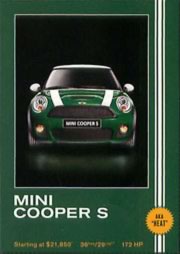
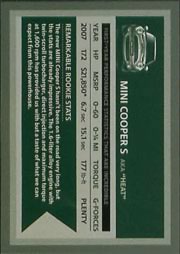
I've mentioned before that I hate my current vehicle — a 2000 Ford Focus. I bought it in a hurry after my 1992 Geo Storm was totaled by a wayward tractor-trailer rig. I've loathed the Focus since day one. Continue reading...
Edmunds True Cost-to-Own calculator
During our ongoing discussion of buying a car, somebody pointed to a handy little tool at Edmunds.com. (Edmunds is an excellent resource, sort of like Bankrate, but for cars.) Here's how their site describes this tool:
You've narrowed your choices to two new cars, but you can't seem to decide which one is really the better deal. The purchase price of each car is nearly the same. The features are similar, and you like the way they both look. Still, a nagging feeling tells you that there must be a meaningful difference between them, even if it's not readily apparent during the purchase process.
Your intuition is right on the money. And now there is a new tool that reveals the hidden costs — all the costs — associated with buying, owning and operating a car over a five-year-period. It's called True Cost to Own.